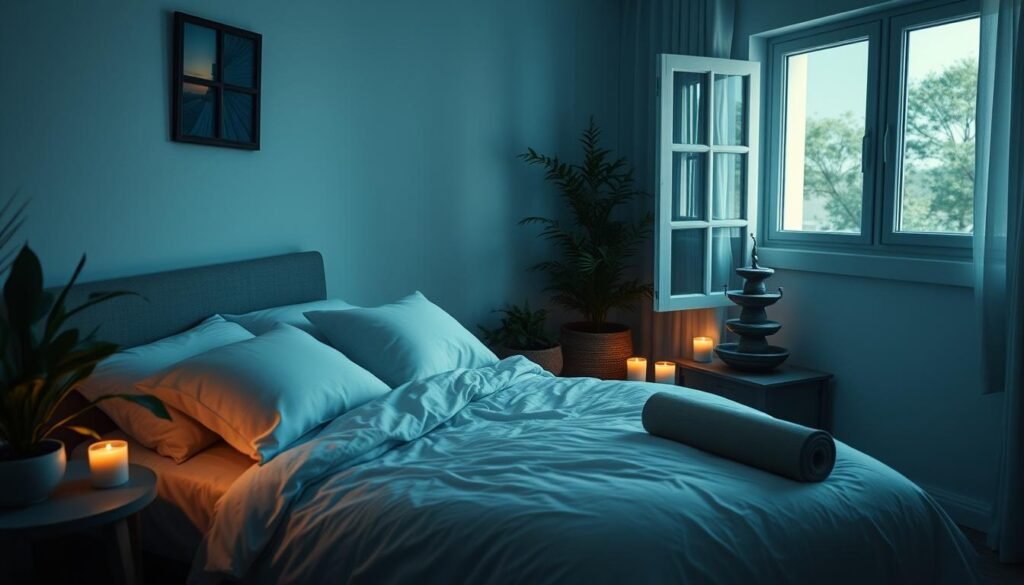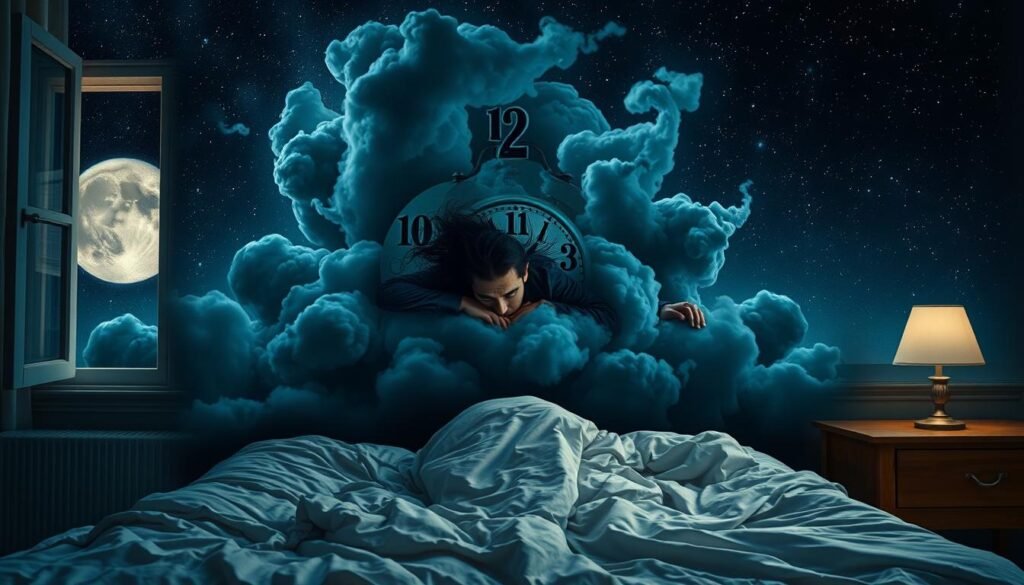Did you know nearly two-thirds of Americans lose sleep due to stress? This statistic shows how common Anxiety-Induced Insomnia is. Anxiety and sleeplessness intertwine, affecting many people. Research shows that 36% of individuals with anxiety also battle insomnia. This creates a difficult cycle of worry and sleepless nights. Luckily, by understanding the problem and using expert advice, people can sleep better and boost their mental health.
Next, we’ll look at practical ways and coping methods to beat Anxiety-Induced Insomnia. We’ll share key tips for those looking for mental health support. Let’s dive in.
Key Takeaways
- Nearly two-thirds of Americans report stress affects their sleep.
- 36% of people with anxiety disorders also suffer from insomnia.
- Improving sleep significantly affects anxiety and stress levels.
- A consistent sleep schedule can enhance sleep quality.
- Relaxation techniques are effective in managing anxiety and promoting better sleep.
Understanding Anxiety-Induced Insomnia
Anxiety-Induced Insomnia happens when worries stop you from sleeping well. People with this issue often can’t sleep properly three times a week or more. Anxiety and stress are big reasons for this type of insomnia. It creates a tough loop where not sleeping enough makes anxiety worse. Mental Health America says about two-thirds of people lose sleep because of stress.
People with this sleep issue usually find it hard to stay asleep. They end up sleeping less and feel very tired during the day. Not getting enough sleep can make the body’s stress hormone, cortisol, go up. This makes anxiety worse. Bad sleep can lead to more anxiety and even depression.
It’s important to see how sleep problems and anxiety are connected to manage stress well. People in this situation see their sleep and anxiety getting worse together. Finding ways to sleep better, like the tips on improving sleep quality, is a key step to feeling better.
Not sleeping enough can cause a lot of problems, like more anxiety. It’s important to talk to doctors about this. They can help you understand your situation better. They offer ways to deal with both anxiety and insomnia. This helps improve sleep quality in the long run.
How Anxiety Triggers Insomnia
Anxiety and insomnia are closely linked. Anxiety leads to sleep problems. When we’re anxious, our minds are overly active. This happens especially when there are no distractions. Such worry activates our ‘fight or flight’ mode. This results in a faster heartbeat and more adrenaline. Because of this, relaxing and sleeping become hard.
Having an anxiety disorder makes insomnia more likely. Research shows that people with anxiety often struggle with sleep. For instance, the HUNT surveys found insomnia is common in those with anxiety. So, understanding what triggers anxiety can help tackle sleep issues.
Stress and unsolved problems can keep us awake. They keep our minds on high alert, leading to ongoing insomnia. Also, not sleeping well can make anxiety worse. It’s a tough cycle to break. But, knowing what sets off anxiety is the first step to better sleep and self-care.
| Aspect | Anxiety Disorders | Insomnia Symptoms |
|---|---|---|
| Prevalence | 13.9% of adults | 28.6% of adults |
| Men | 10.0% | 23.5% |
| Women | 17.0% | 32.7% |
| Major Depression | Occurs in 63% | — |
| Comorbid Conditions | PTSD, GAD, Panic Disorder | Greater insomnia symptoms reported |
It’s crucial to deal with what makes us anxious to sleep better. Reducing anxiety can improve sleep. This helps those with anxiety disorders get the rest they need. For more on insomnia and its link to anxiety, check out Understanding Sleep Disorders.
Recognizing the Symptoms of Anxiety-Induced Insomnia
Grasping the symptoms of insomnia linked to anxiety is vital. This type of insomnia displays psychological signs pointing to deeper issues. Worry fills the mind, leading to thoughts that race, preventing relaxation and sleep. This can result in feeling worn out during the day but unable to sleep at night.
Signs to look out for include:
- Difficulty falling asleep
- Waking too early
- Feeling fatigued upon waking
- Frequent awakenings during the night
- Daytime irritability and lack of focus
Spotting these symptoms of insomnia is key to finding ways to get better. Not addressing chronic sleep issues may increase the risk of anxiety disorders and other mental health problems. It’s important to tackle these symptoms early. This helps prevent more issues that could harm your health.
The link between anxiety and troubled sleep is strong. Anxiety can worsen sleep issues, creating a hard-to-break cycle. Knowing the symptoms is the first step in taking control.
| Symptoms of Anxiety-Induced Insomnia | Psychological Signs |
|---|---|
| Difficulty in falling asleep | Excessive worrying |
| Frequent awakenings | Racing thoughts |
| Fatigue upon waking | Panic attacks |
| Irritability during the day | Lack of concentration |
| Restlessness at night | Increased anxiety levels |
Relaxation Techniques to Combat Insomnia
Relaxation techniques are a strong tool against anxiety-caused insomnia. Methods like deep breathing and muscle relaxation can boost sleep. They trigger a natural relaxation response. This response lowers stress and makes the mind peaceful and ready for sleep.
Deep Breathing Exercises
Deep breathing can calm your nervous system easily. Here’s how to do it:
- Find a quiet, comfy space.
- Inhale slowly through the nose for four counts.
- Hold that breath for four counts.
- Exhale through the mouth for six counts.
- Do this cycle for 10 to 15 minutes.
Doing deep breathing exercises often can lessen stress. It improves sleep. Try it daily for 20 to 25 minutes over two weeks for the best effect.
Progressive Muscle Relaxation
Progressive muscle relaxation (PMR) means tensing then relaxing muscles in order. It eases both your body and mind. Start with your feet and work up to your head:
- Squeeze your feet muscles for five counts, then let go.
- Do the same with your calves.
- Keep going up to your head.
Having a healthcare provider show you PMR can help a lot. This method, with deep breathing, helps lower your heart rate and blood pressure. This creates a peaceful feeling that is good for sleeping.

Making these techniques part of your day takes effort, but it’s worth it. Keeping track of how each method works for you can be useful. Resources like relaxation exercises offer more help and support.
Implementing Effective Sleep Hygiene Practices
Good sleep hygiene is key for managing insomnia caused by anxiety. Making simple changes to daily routines and how we sleep can make a big difference. It’s important to have a regular sleep schedule and a calm place to sleep. These steps help improve health and well-being.
Establishing a Consistent Sleep Schedule
Having a set sleep schedule helps our body’s natural clock. Sleeping and waking up at the same times every day helps us get better rest. Studies show people with good sleep habits have fewer sleep problems. Only 56.1% of them have issues, compared to 76.5% with poor habits.
- Set a fixed bedtime and wake-up time, even on weekends.
- Avoid long naps during the day to ensure nighttime sleepiness.
- Create a relaxing pre-sleep routine to signal to the body that it’s time to wind down.
Creating a Calm Sleep Environment
A peaceful sleeping area helps us fall and stay asleep. Keeping distractions away and making sure we’re comfortable are key. Those who make their bedroom peaceful often feel less tired during the day. Only 11.7% report excessive sleepiness, compared to 22.5% with poor sleep habits.
Here are some tips:
- Decluttering the bedroom and reducing noise levels.
- Ensuring the mattress and pillows are comfortable.
- Using blackout curtains or an eye mask to keep the room dark.
- Limiting exposure to electronics at least an hour before bed.
Mixing a stable sleep schedule with a great sleeping space is crucial. It can greatly reduce anxiety. Studies show a big difference in depression rates between those with poor versus good sleep habits. 75.8% of those with bad habits report depression, versus 59.6% who practice good sleep hygiene.
| Sleep Hygiene Score | Percentage of Sleep Problems | Daytime Sleepiness Rates |
|---|---|---|
| Good (33-44.0) | 56.1% | 11.7% Excessive, 1.2% Severe |
| Poor (9.0-22.0) | 76.5% | 22.5% Excessive, 5.2% Severe |
Improving sleep hygiene is safe and affordable. It’s a great way for public health efforts to fight insomnia and boost America’s overall sleep quality.
The Connection Between Anxiety and Sleep Disorders
The link between anxiety and sleep problems is both strong and intricate. Around 24% to 36% of people who can’t sleep well also have anxiety. When looking at those who sleep too much, the number goes up to 27% to 42%. This shows how closely connected anxiety and sleep are, especially for our mental health.
People with problems like generalized anxiety disorder (GAD) and PTSD often struggle to sleep well. This is because their alarm systems inside are not working right. This leads to trouble both falling asleep and staying asleep. Breaking this cycle is key for better mental well-being.
Sleep is made up of deep sleep (NREM) and dreamy sleep (REM). Problems in these stages can happen because of anxiety. In fact, up to 30% of adults say they have trouble sleeping. And those with ongoing sleep issues are more likely to develop anxiety disorders.

Sleep patterns are controlled by our body clock and need for sleep. Chronic insomnia might be a sign of anxiety or even a warning of depression. Treating sleep issues can thus help reduce anxiety. This helps create a healthier state of mind.
Anxiety-Induced Insomnia: The Vicious Cycle
Many people in the U.S. struggle with a hard cycle of insomnia. Around 20% of U.S. adults battle with anxiety, says the National Institute of Mental Health. Studies show that 24 to 36% of those with anxiety disorder also can’t sleep well. This links anxiety and insomnia in a way that worsens both. It’s important to see how they connect to manage anxiety better.
Symptoms of anxiety-induced insomnia include having trouble to fall asleep, waking up a lot at night, and finding it hard to sleep again after waking up early. People may feel very tired during the day and have a hard time focusing. They might also worry too much about going to bed.
- Trouble falling asleep
- Frequent awakenings during the night
- Difficulty going back to sleep after early morning awakenings
- Daytime tiredness
- Difficulty focusing
- Worrying excessively about going to bed
Breaking this tough cycle needs different methods. Treatments often include therapy, mindfulness, and techniques to calm the mind before sleep. Doctors might suggest medicine if other methods don’t work. Yet, it’s wise to use medication carefully to avoid dependency.
Many Americans deal with both anxiety and insomnia. As many as 90% of those with PTSD have nightmares that keep them awake. Long-term stress from anxiety disorders can mess up sleep too. Not sleeping well makes anxiety worse, which continues the cycle.
To fight insomnia, it helps to follow good sleep habits. Doing physical exercises can lessen anxiety and help with better sleep. Making small changes like less screen time before bed or relaxing activities can make falling asleep easier. These steps can help end the cycle.
Cognitive Behavioral Therapy for Insomnia
Cognitive Behavioral Therapy (CBT) is a strong approach to help people with insomnia caused by anxiety. It focuses on changing thoughts and actions that hurt sleep. CBT is known for its effectiveness in both sleep issues and anxiety management.
Understanding CBT Techniques
CBT offers methods to change negative thinking about sleep. Cognitive Restructuring helps patients think positively about sleeping. Tools like Sleep Restriction Therapy (SRT) and Stimulus Control Therapy (SCT) teach healthier sleep habits. Studies show CBT-I improves sleep quality significantly, reducing the time it takes to fall asleep by 19 minutes and increasing sleep efficiency by 10%.

Benefits of CBT for Anxiety Management
CBT for Anxiety Management has many benefits. It aids about 70% to 80% of patients with primary insomnia, improving their sleep greatly. This method also increases sleep by an average of 8 minutes. It’s as helpful as sleep meds but lacks their side effects.
CBT helps avoid problems like memory issues and drowsiness in the morning. It encourages lasting sleep benefits and lowers the chance of relapse. Using CBT strategies helps people handle their anxiety and insomnia better. It leads to improved sleep routines and relaxation techniques. A lot of adults suffer from insomnia, so using CBT can really help. For more info on enhancing sleep through cognitive behavioral therapy, visit Mayo Clinic Insomnia Treatment.
Lifestyle Changes to Improve Sleep Quality
Making changes in your lifestyle can greatly boost your sleep quality. Focus on nutrition, exercise, and steering clear of stimulants. By adopting a holistic approach, you can better your sleep and reduce the anxiety that often leads to insomnia.
Importance of Nutrition and Exercise
Eating right is crucial for good sleep. Foods high in complex carbs, like whole-wheat toast or oatmeal, help release serotonin. This hormone helps you sleep better. Exercising regularly is also key. People who exercise tend to sleep well and feel less anxious. Being in sunlight is important, too. A study from 2022 found that bright light during the day can improve your sleep’s duration and quality.
Avoiding Stimulants and Heavy Meals
Having stimulants like caffeine and nicotine late in the day can harm your sleep. Drinking caffeine late can shorten your sleep by up to 45 minutes. Eating big or spicy meals before bed can also disturb your sleep. It can make you uncomfortable and raise your body temperature. Try to eat earlier so your body has time to digest before bed. Making these changes can improve both your eating habits and your sleep quality.
| Lifestyle Factor | Impact on Sleep Quality |
|---|---|
| Nutrition | Complex carbs promote serotonin release; timing of meals matters. |
| Exercise | Regular physical activity aids relaxation, reduces anxiety. |
| Caffeine | Reduces sleep time and efficiency; avoid late consumption. |
| Heavy Meals | Can disrupt sleep; better to eat earlier in the evening. |
| Daylight Exposure | Improves sleep duration and synchronization; essential for well-being. |
Seeking Professional Help: When to Consult a Specialist
When self-help methods don’t work, seek Professional Help. A Sleep Specialist offers personalized advice for those battling insomnia due to anxiety. They ensure conditions like depression are well identified and treated. This helps manage sleep troubles more effectively.
A sleep study might be needed if the reason for insomnia isn’t clear. It helps identify disorders such as sleep apnea or restless legs syndrome. Cognitive Behavioral Therapy (CBT) is often the first treatment recommended. Studies show it’s as effective, if not more, than medications for insomnia.
Adding stimulus control therapy can make treatment more effective. Stick to a regular bedtime, use the bed only for sleep and intimacy. If you can’t sleep within 20 minutes, leave the bedroom. Drugs like Eszopiclone and Zolpidem can offer short-term relief but aren’t good for long-term use.
Lifestyle changes can greatly improve sleep quality:
- Maintain a consistent sleep schedule
- Engage in regular physical activity
- Limit daytime naps to 30 minutes
- Avoid caffeine, alcohol, and nicotine before bedtime
Explore alternative therapies, though their effectiveness has limited proof. For lasting insomnia, asking for help is crucial. It deeply affects mental well-being and life quality. When sleep and anxiety troubles continue, a specialist’s advice is key for restful sleep and managing anxiety.
| Treatment Options | Description | Effectiveness |
|---|---|---|
| Cognitive Behavioral Therapy (CBT) | Therapeutic approach targeting thoughts and behaviors affecting sleep. | High effectiveness, recommended first-line treatment. |
| Polysomnography | Sleep study to diagnose underlying sleep disorders. | Essential for accurate diagnosis in unclear cases. |
| Prescription Medications | Short-term use of sleeping pills. | Short-lived relief; generally not for long-term use. |
| Lifestyle Modifications | Changes in daily habits to improve sleep. | Supportive for long-term sleep quality. |
Conclusion
Beating anxiety-related insomnia needs a full plan. It mixes understanding the issue with effective sleep fixes. Knowing how anxiety and sleep problems are linked is key, because those with anxiety often have sleep troubles.
Using relaxation methods and keeping up with good sleep hygiene helps make a soothing sleep space. For those struggling a lot with anxiety and insomnia, getting professional help is crucial. Sleep meds approved by the FDA can help but use them carefully.
Nonbenzodiazepines are now often suggested. They are seen as safer than older sleep meds. It’s really important to look after any other health problems too. People with both anxiety and insomnia are at higher risk of their mental health getting worse.
Studies show managing both can make sleep and everyday life better. For more info on how insomnia, anxiety, and mental health are connected, check out this in-depth study.